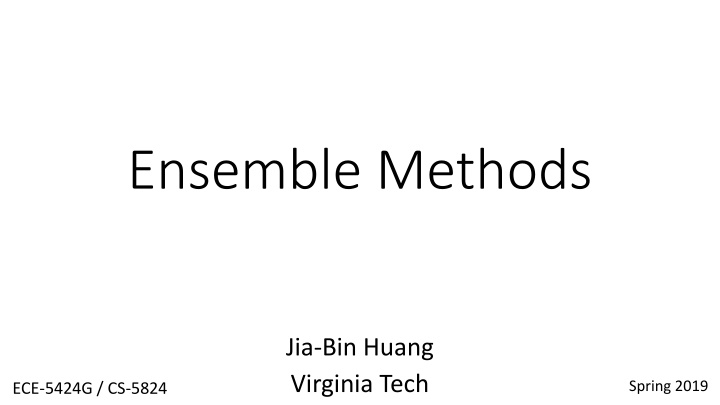
Advanced Topics in Semi-Supervised Learning and Deep Reinforcement
Explore advanced concepts in semi-supervised learning and deep reinforcement techniques taught at Virginia Tech. Dive into topics such as ensemble methods, generative models, sequence prediction, and more for a comprehensive understanding of cutting-edge machine learning strategies.
Download Presentation

Please find below an Image/Link to download the presentation.
The content on the website is provided AS IS for your information and personal use only. It may not be sold, licensed, or shared on other websites without obtaining consent from the author. If you encounter any issues during the download, it is possible that the publisher has removed the file from their server.
You are allowed to download the files provided on this website for personal or commercial use, subject to the condition that they are used lawfully. All files are the property of their respective owners.
The content on the website is provided AS IS for your information and personal use only. It may not be sold, licensed, or shared on other websites without obtaining consent from the author.
E N D
Presentation Transcript
Ensemble Methods Jia-Bin Huang Virginia Tech Spring 2019 ECE-5424G / CS-5824
Administrative Fall 2019 ECE 6524 / CS 6524 Deep Learning Time: likely 8:00 AM Location: TBD (waiting for registrar s office)
Advanced Topics Semi-supervised learning Ensemble learning Generative models Sequence prediction models Deep reinforcement learning
Semi-supervised Learning Problem Formulation Labeled data ?1,?1, ?2,?2, , ???,??? ??= Unlabeled data ??= ?1,?2, ,??? Goal: Learn a hypothesis ? (e.g., a classifier) that has small error
Semi-supervised Learning Motivation Problem formulation Consistency regularization Entropy-based method
Stochastic Perturbations/-Model Realistic perturbations ? ? of data points ? ??? should not significantly change the output of h?(?)
Semi-supervised Learning Motivation Problem formulation Consistency regularization Entropy-based method
Entropy minimization Encourages more confident predictions on unlabeled data. EntMin Pseudo-labeling Add confidently predicted samples into the training set
Class mismatch in Labeled/Unlabeled datasets hurts the performance
Lessons Standardized architecture + equal budget for tuning hyperparameters Unlabeled data from a different class distribution not that useful Most methods don t work well in the very low labeled-data regime Transferring Pre-Trained Imagenet produces lower error rate Conclusions based on small datasets though
Ensemble methods Bagging Gradient boosting AdaBoosting Following slides are from Alex Ihler
